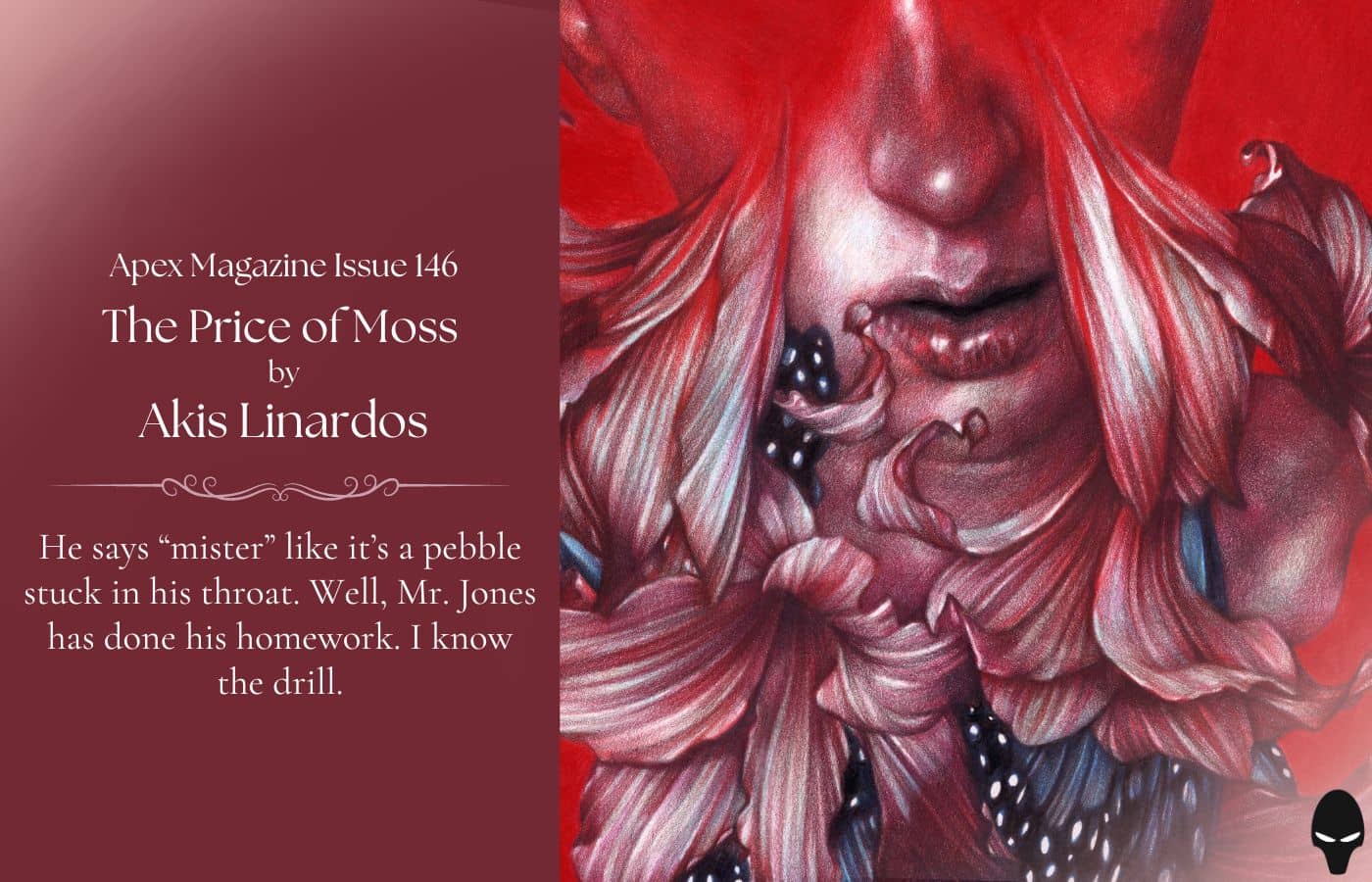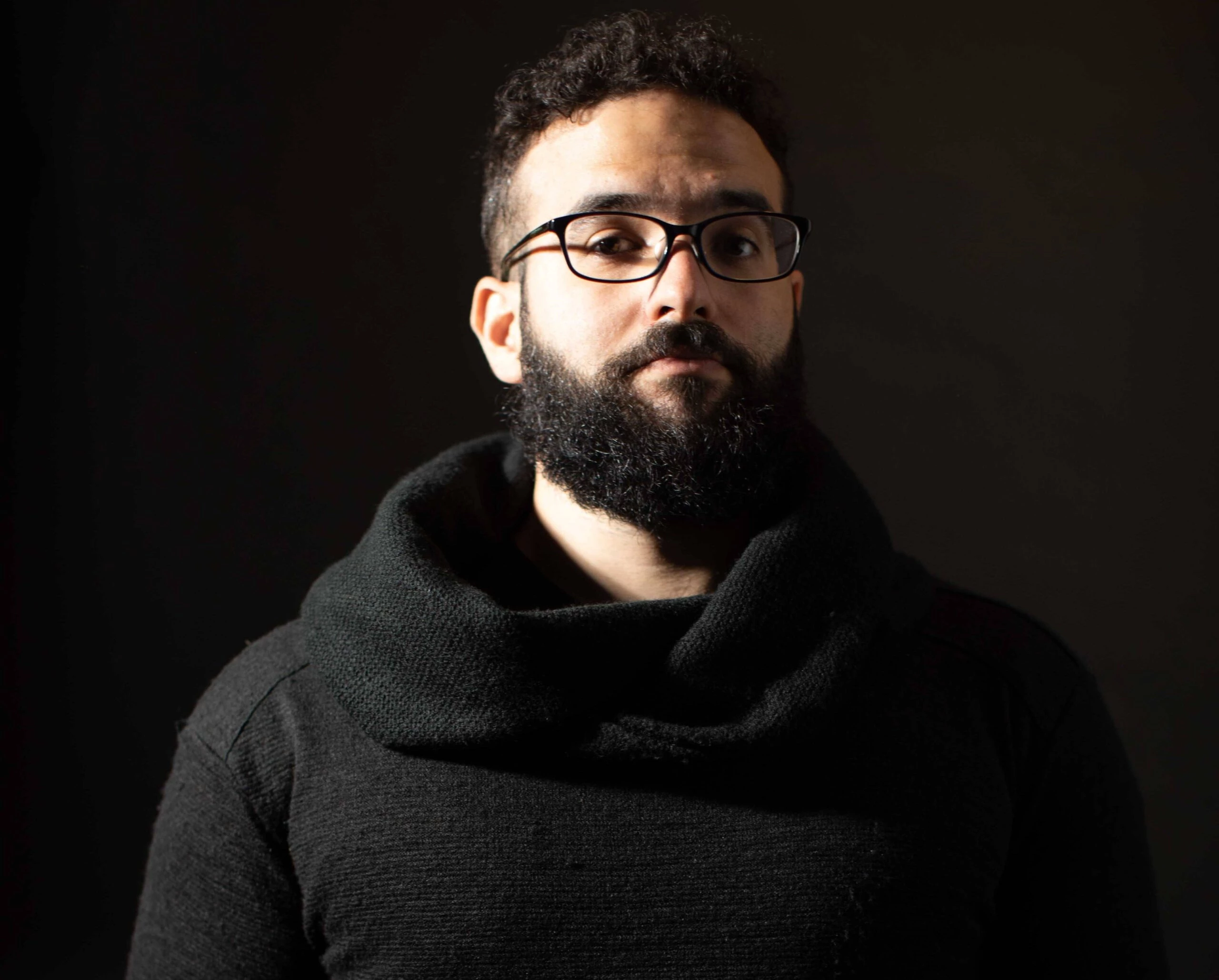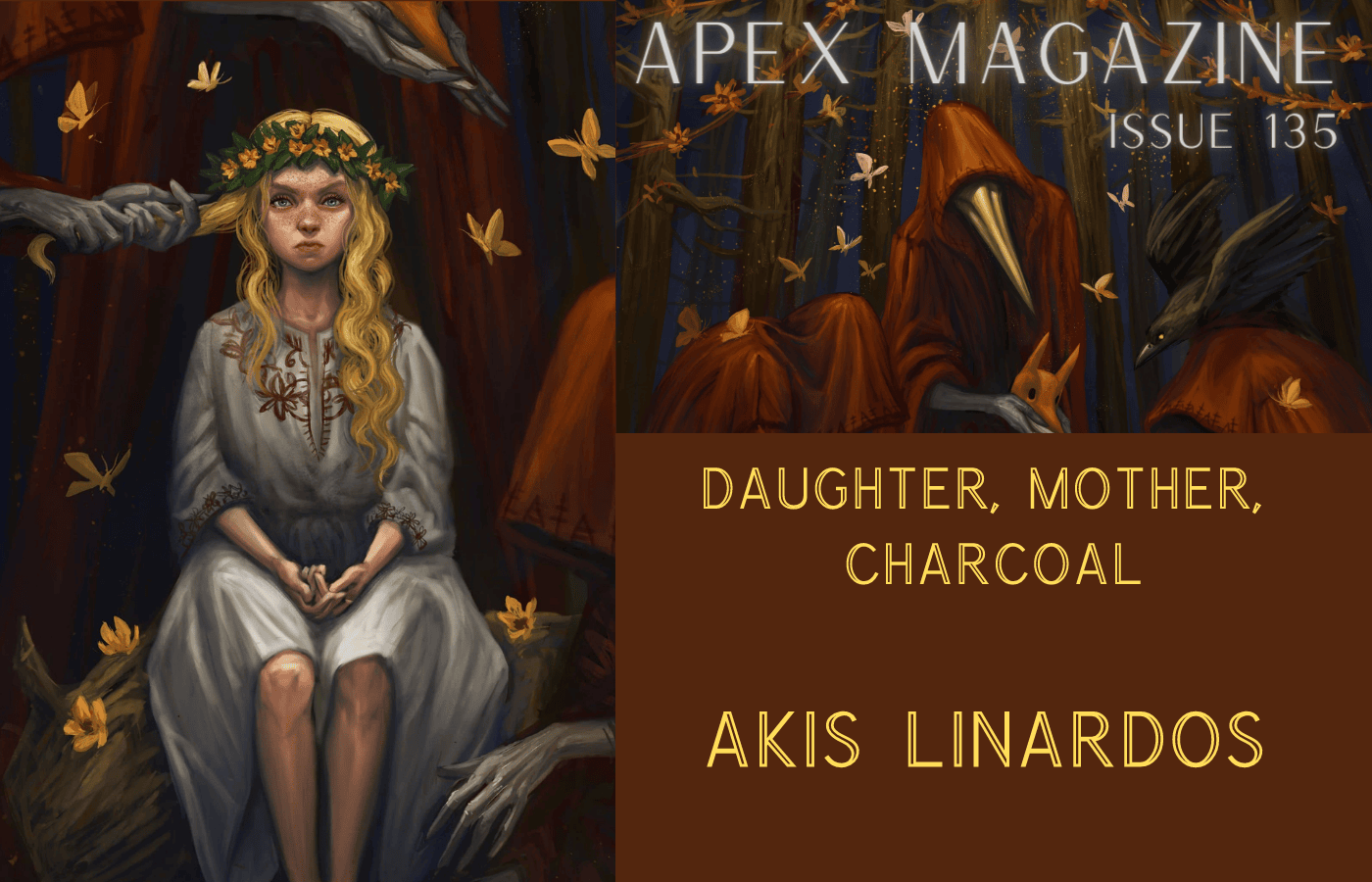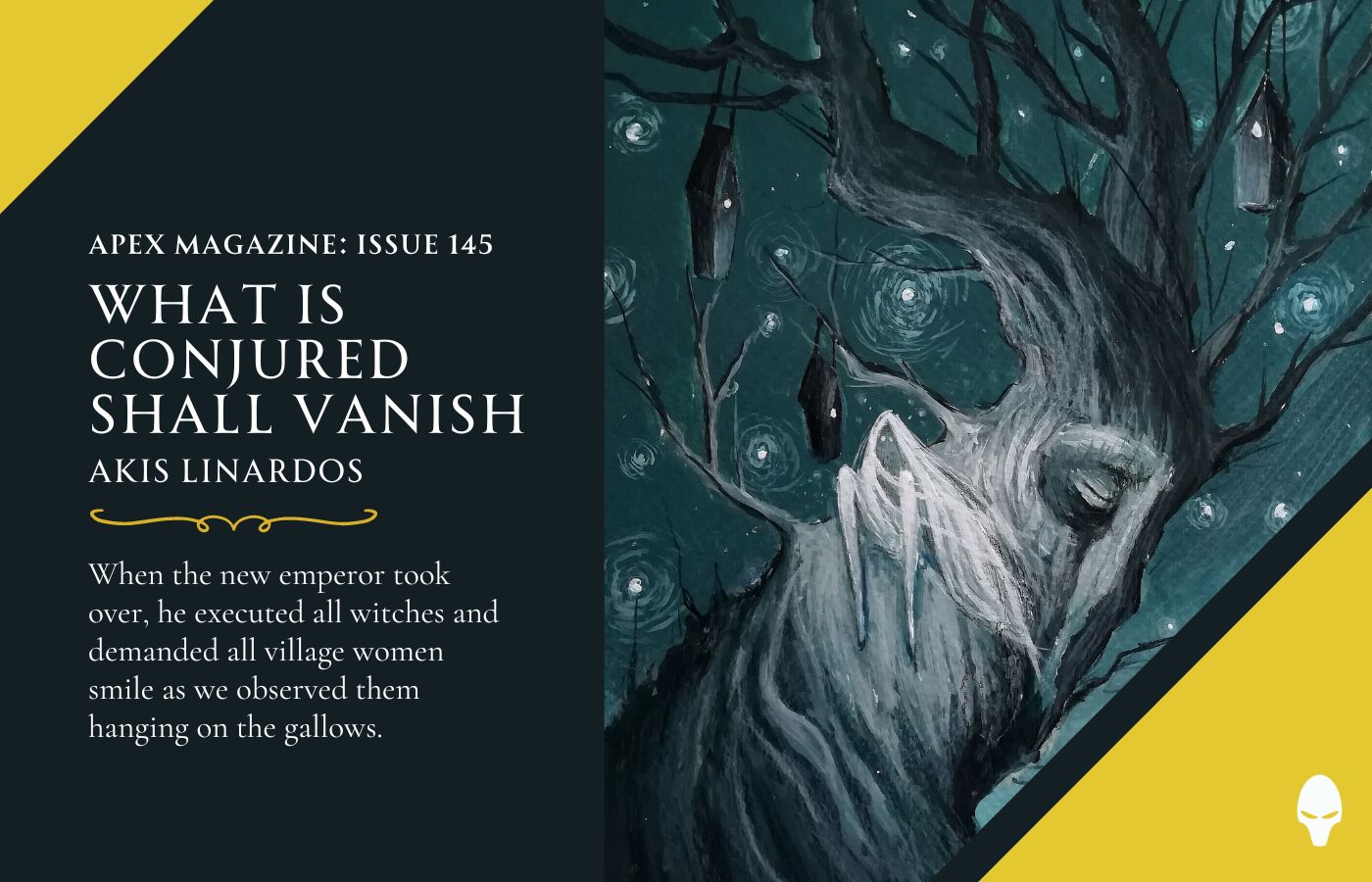
Day 1. Carbon Footprint offset: 0%
Across the silver table, the Council of Three regards me with milky-white eyes and veins green with chlorophyll. A woman with eyebrow strands the shape of tiny carrots, a reed-thin man with purple lanky hair, and a hunchback with a wide yellow-toothed smile and a beard of roots like his face was recently plucked from a garden. When he speaks, sharp floral scents waft from his mouth. “How far,” he says, “would you go to protect the environment, Mr. Jones?”
He says “mister” like it’s a pebble stuck in his throat. Well, Mr. Jones has done his homework. I know the drill. Yet my heart drums and the syringe in my hand is ice-cold. It’s shaped like a gun, and where the safety would normally be there’s a bottle filled with sanguine fluid and floating seeds like spring onion buds.
I have to do it. I belong here, in the island city-state of Moss, split from my dirt-poor ditch of a home country our precursors squeezed dry. Moss has conquered sustainability, and with it, the future.
“No sacrifice is too big,” I say. “To live is to infest. To be virtuous is to offset one’s parasitic nature.”
I’m no longer sure whether I say it to impress them or to convince myself I’m doing the right thing, but it works. They nod approvingly, and my chest brims with determination as I plunge the syringe into my wrist. I wince and pull the trigger. Along my arm, a green rivulet flows and dilutes the purple of my veins. Stings like lemon juice on an open wound.
Pain is good. Pain is the way of nature.
The reed-thin man leans forward and for a moment I think he’ll snap in two like a twig. “How would you quantify the relative societal benefit of an individual compared to their carbon footprint?”
Gods, really? These guys won’t even wait for my pain to subside.
Deep breath. Put on my good face. The citizenship exam has begun.
Day 4. Carbon Footprint offset: 3.7%
They’ve allocated me to the northeast sector of the artificial islands—a hexagonal platform dotted with igloo-shaped houses and a domed arboretum. The ceiling of my abode is made of glass, and the amber-honey light of the sun douses its sole chamber. It houses a table with one chair, a kitchenette, a cot, and a hole in the ground in place of a proper toilet—no doubt feeding straight to some fertilizer production pipeline. Minimalism was Moss’s way to adapt to climate change—aside from the genetic modifications.
My food reflects that: toast, algae jam, and a bottle of water. As I spread the jam on the toast, my gaze strays to the table surface, where my imagination conjures the shape of an ear among the resin. Like the Council is still listening, waiting for me to mess up this simple task of breakfast.
The toast tastes mushy, and I have to force myself to gulp it down. The taste of Mum’s tangy tomato omelet flashes in my mind and I salivate while my heart throbs with homesickness.
Am I a horrible son for leaving her behind, alone to deal with Grandpa’s dementia?
No. I’m doing this for her, too. Even if she doesn’t see it—or pretends she doesn’t. I’ll be of so much more use from here. The money that I’ll make if I land a job maintaining the horticulture drones or tending the kelp gardens—it will help her get him into a nursing home.
Would you put me in a nursing home when I grow old?
Her last words coil around my mind, a goodbye whisper as low as the flutter of leaves but at the same time as loud as a falling trunk. I left without saying anything, which was better than saying what was on my mind: if you lose yourself like Grandpa has, yes.
It’s what I’d want from my kids too, if I ever have them. A parent turned to burden, and by the time Grandpa dies, she’ll be relieved. Would she want me to be relieved at her death?
I spread jam on another piece of toast, and bring it with me outside, craving fresh air.
A clean, salty breeze hits me, and trees shade me in a rich canopy overhead. Polished streets with none of those dust devils carrying refuse from junk mounds that piled the concrete jungle I called home. It’s better in every way.
Then why does it hurt so much?
Across the street, a playground secluded by a glass fence is filled with kids so solemn they look like adults trapped in child skin. They don’t play, seated on frozen merry-go-rounds, they’re studying books so thick it’s a wonder how their fragile arms can hold them suspended so long. Others form shapes in the sand pits, equations and chemical formulas of photosynthetic mechanisms.
The sidewalks are lined with trees with thick gnarly roots piercing into gardens of carrots, cauliflower, and broccoli. Every ten steps yellow labels read in blinking green letters: Need Less, Provide More!
I find a nice spot for my miserable picnic by a genetically modified tree whose wood is so orange it makes me think of juice. Its leaves are spidery, stems with flat interspersed appendages to maximize surface for optimal sun absorption, slanting like tiny solar panels. In the creases of the bark, the outlines form a sort of face, with thinly shut eyes and a branch for the nose. Wrinkled as it looks, I am reminded of my grandpa again. I wish he’d slept as peaceful as a plant. At least then Mum wouldn’t have to wake at midnight from his nonsensical wails about cable-shaped snakes eating his pillow and tiny policemen who steal his shoes. Heck, I almost wish she was a tree for a day, just to get a break.
The bark is soft, making it ideal to lie against as I drop cross-legged on the cool lawn. As I’m about to eat the toast, I notice my wrist. A verdant mark has etched itself there, the veins still green and prominent around the pinprick the needle made. They haven’t given me the exam results yet, but I’m confident I answered their questions right. I stumbled a few times and had to correct myself or pause, but who could cover the entirety of body eco-modifications—bioengineering, genetic alteration, and agricultural robotics—in one hour when under immense pain?
I did fine. I know I did. And I have papers on oceanic farming to show, which given the measly resources of my hometown’s university should impress them.
A buzz of drones, and a man focused on a tablet pass by. He’s controlling the drones, guiding them to spray the trees with biostimulants. I can tell by the seaweed scent. A scent so expensive in my mind, too precious for our academic experiments back home, but here it’s everywhere.
Another world, a different arena with its own brutal difficulties. Papers had impressed them enough to invite me here, but it’s no more than a first filter. Now they mean nothing. Staying here is the real challenge.
I fold the toast around the jam and swallow it whole, so the taste barely grazes my tongue.
Day 9. Carbon Footprint offset: 9.7%
I awake to burning pain in my left wisdom tooth. When I tongue the molar, there’s a taste like rotten fruit. I trudge to the mirror by the potty-hole and brush my teeth. Helps with the taste, but not with the pain, and rinsing my mouth with saltwater only further irritates it.
On the far wall, a message in red letters flashes to life. Didn’t even realize there was a screen there. It’s so well embedded in the curving wall, and the whole place is polished so clean and shiny it was easy to miss. The words read, You have mail. Sender: Mr. Happy.
That’s the root-beard hunchback. I assume it’s a touch screen, so I tap on it. The message reads:
Dear Mr. Jones,
We were delighted to make your acquaintance and hope you are finding your accommodation to your liking.
How kind of them.
That said, we’re sad to say the first trial did not go as we would have hoped. You have failed the test, but don’t be discouraged. We have attached to this message a package of books detailing all the topics we will be discussing in our next session, a month from today. Your second injection will be prepared at the time. We have high expectations of you.
Stay happy, stay mossy.
Mr. Happy (:
How could they disqualify me? I answered everything. Do they want the lessons so deeply ingrained that responding within seconds becomes second nature? Is that the purpose of asking me while I’m in pain?
Deep breath. All’s good, it’s just the first shot. I’ll study harder. It’s not like I’m not used to struggle. At least this time, I can focus, free of distractions that plagued me back home like my boss’s laundry, or the side-hustle junk scavenging I did for pennies I then slipped in Mum’s savings in secret.
I take a walk around the city to clear my mind. Some people are lying flat on the ground with semi-transparent clothes to absorb sun energy, or manipulating parameters in tablets and visors, remote-controlling the drones that keep the streets pristine clean, the trees optimally nourished, the air fresh. Human-in-the-loop is still supposedly more efficient to full automation, though even the humans themselves seem automated—no energy wasted, precision in every movement.
There’re street vendors, too, selling delicacies, which are really another variant of algae only molded to appealing green balls, and choked full of sweeteners to hide the guck. Their eyes are expressionless, their veins more prominent and greener the older they are. I nod a greeting, pretending to belong. But when they smile and wave back, it looks theatrical, the smile a poor pastiche, a copy of something they’d once seen in a movie and struggle to replicate.
Maybe it’s my imagination. It’s normal, being in a new place, different culture. It will be fine.
I meander into the arboretum, a glass dome three times my height housing vibrant plant life. Too vibrant. The combined scents of lilies, hyacinths, lilacs, and a dozen flowers I cannot name are so dizzying they make my head spin. Surely, I’ll get used to it.
A middle-aged couple walks toward me, down one of the aisles. Stand straight, I tell myself, smile wider. Gotta fit in, gotta make friends. Show them I love their city. Perhaps say hello in their own tongue, or tell them what a great day it is. They’ll love that.
I raise my hand. “Kanak talo! Uan bue dea!”
They frown and respond with a fake-polite smile, a hesitant nod, and a ‘hi’ in my own tongue. My accent must be so bad that it puzzled them I even tried.
“Uptight pricks,” I mumble, unable to deny the creeping disillusionment with this place. Their language didn’t just develop after the schism from the mainland. It was forced to further segregate themselves from a language riddled with bias toward cultures of excess. They could have developed a damn dialect.
Bear with it, I tell myself. The benefits will be worth it.
The scents get too overwhelming, and I exit the arboretum to get a breath of sea-freshened air. There was something odd about the couple—besides their attitude, which to be fair is not even that odd here. These ones had multiple wrinkled brown moles along their necks. Birthmarks maybe? But both had them, and the injections supposedly get rid of any birthmarks quite fast.
A shiver runs down my spine that makes my own green-mutating veins throb. I tongue my molar and wince at the pain. The sour, rotten-fruit taste is back, too. Better give it another brush and rinse. Hope it doesn’t get worse. I can’t deal with a doctor so soon, nor all the bureaucracy that entails. There are long nights of studying ahead, and no one to support me. Not even empowering words to remember I have people believing in me.
What’s good in having a kid that abandons you?
I know that Mum didn’t mean those words. She probably regrets her goodbye accusation as well. It was her maternal defense mechanism, conjuring excuses to guilt me into staying. Emotion clouds a mother’s judgment and makes them blind to strategy. I did what I had to for the good of our family. I wouldn’t have a second parent work themselves to death.
As I make my way back home, I smile at the families tending their gardens—practice a smile that replicates the one the middle-aged couple gave me, timid and polite. A smile that sits alien on my face, but might as well fake it until the injections numb the uncomfortable feelings of isolation.
It strikes me that there are no old people here—no one beyond middle-age. Perhaps they’re in specific neighborhoods? It seems like such a calm place, so fitting for the elderly. Perhaps the injections keeps them younger. I haven’t heard of such a perk, but I certainly wouldn’t mind it.
And the kids—their gait is like a march. Clockwork soldiers that follow their parents, eyes devoid of innocent curiosity, staring straight ahead oblivious to their surroundings as only adults learn to be. As if they have already seen all there is to see in the world.
Day 17. Carbon Footprint offset: 29.7%
I’m drowsy, but somehow more focused. A brain cancels out anything irrelevant, including desire. I breezed through two out of the thirteen tomes they sent me in less than a week. Don’t have anything better to do here, anyway. Making friends has been impossible.
Community events are uncomfortable crowds of forced small talk, everyone wearing invisible social walls around them toward anyone that isn’t family. Probably to anyone that is family as well. Marketplace is like a soul-less conveyor belt, where any word besides the necessary for a transaction is frowned upon. Like even words themselves are wasteful and should be used as precious currency.
By the platform’s edge, I found another spot to lie against a tree whose trunk is just as soft. Nearby, the water surface glimmers viridian with algae, a sea garden for produce and oxygen both. Despite the strong briny scent, the gentle waves make for a soothing background as I read the third tome: Suicide of the Mind: The Key to Communal Adaptation to Worldwide Catastrophes. One quote sticks with me down to punctuation: ‘A mind that needs less is happier. A mind that needs nothing, the happiest.’
By the time I reach the sixtieth page, I hear a whisper, as clear as if my grandpa was here with me, spouting his nonsense: “Roots reach into the core.”
I whip my head but of course no one is there. He’s back home, thousands of miles away, tortured by his own mind and, by extent, torturing Mum as well.
Carrots sprout from nourished minds.
I palm my ears and rub whorls with my wrists. Is this an aftereffect of the injection? I’ll need to ask the Council next time.
Maybe I strained myself reading. Time to pack up.
As I make my way home. pieces from a fragmented conversation reach me. A mother asking her teenage boy, “Did you remember to water Grandpa?”
The mother is riddled with faint signs of green veins, but the boy is still clear—or appears to be. He trudges toward a tree in their garden, carrying an open hose, and begins watering it. And the tree itself … gnarled roots form the shapes of human feet, and in the bark there’s the creased face of an unsmiling old man with a leaf over his left eye slit.
Now I can see them—the elderly. Everywhere.
They had always been there; my gaze breezed past them, but I never really noticed. It’s subtle in some trees, similar to the two I’ve been sitting under, enough to dismiss it as odd formations my imagination exaggerates. But in others, you can tell if you look hard enough. Trees with the faint traces of hands, legs, and wrinkled faces of men and women, their frozen, tree-bark mouths elongated in unsettling O’s.
Is this the final destination of every citizen? Is this the price of the hyperfocus, the clean air, the citizenship? The price of life in the thriving city of Moss?
My molar stings. I rush away, trying but failing not to look at the things I hadn’t noticed. How the gnarled roots have joints like fingers, how they pump slightly feeding into the produce of the vegetable gardens.
And another whisper that I’d dismiss before, from the orange tree I sat on my first day here: “Fertilize a heart with starlight.”
Once I reach home, I yank my toothbrush from the cupboard, and rub my teeth as if I’m scrubbing the dirtied back of a toilet. My molar burns with pain, but I don’t care. I can’t stand this taste of rot.
A sharp pain and a spurt of blood. A yelp escapes me, and I spit syrupy blood with a viscous green fluid into the sink. My molar, dislodged, floats between my gums and cheek. I spit it out. Moss covers the root of it, rough and smelling like spoiled onions.
As I twist it in my hands, my mind conjures an image on its curved glassy surface, a reflection of Mr. Happy’s smile.
Day 49. Carbon Footprint offset: 42.7%
The time for the second trial is here, and, under the glare of the Council, I can’t stop tonguing the fleshy gap my molar left behind. But wisdom teeth are unnecessary, and that’s what the injections are for. To get rid of excess.
Too much life is excess, too. Especially artificially prolonged, reaching a stage of being a burden to society and family. This is all for the best.
The syringe nests heavy and cold in my shaking hand. I haven’t pierced myself yet, but the questions have already begun. I’m sure they will save the hardest for afterwards. They don’t mention the elderly trees, but why should they? It’s the communal thing to do: produce even at old age. Be sturdy and still, a burden to no one, a blessing to all.
“It’s time,” the short woman says, disrupting me from my thoughts.
My fingers clench around the syringe. The needle hovers over my wrist, but I can’t bring myself to pierce the vein.
“The old people,” I say. “Do they feel pain when someone cuts their twigs?”
Mr. Happy smiles wider. So wide and so sudden his beard roots jiggle like tentacles to the abrupt motion. “Would that change anything?”
“They don’t, do they?” I say. “They don’t feel anything anymore.”
A brief silence. Then the short woman says, “Instead of a deteriorating body, they are granted numbness to pain and remain productive members of society by balancing out the carbon footprint. You want to be a good member of Moss, don’t you?”
I nod. She’s right. I want to be a good member of society. Whatever it takes. What other option do I have, really? Go back? Live my life in a ditch? Put up with the stench and the yells and all the misery? So that I, what, get to grow old and wrinkled with bones that hurt all over and—
“You’ll break it,” Mr. Happy says, and I notice how hard I’m clenching my fist around the syringe.
Some of the veins on my wrist have already turned green. What would my face look like on a tree? What would Mom’s or Grandpa’s faces look like on trees? Quiet. Calm. Unthinking.
All pain slipping away forever.
Why run? No one else does. This is a land of opportunity. A land that conquered old age. A land that conquered sustainability.
I can lift my family from poverty.
I relax my grip around the warm syringe and raise my gaze at Mr. Happy.
The needle pointed shakily on my wrist, I try to mirror his smile but find my face quivering. In my mind’s eye, I see my life, free of sickness, focused tunnel-vision-like on maintenance of Moss, a citizen slowly turned to part of the city: a motherless tree in a vast garden, hissing whispers to newcomers that seek to read a book in my sylvan embrace.
Roots reach down the core. Carrots sprout from nourished minds.
Is it nonsense or are they trying to send a message—translate a world I fail to see?
Grandpa would get occasional flashes of happy memories or laughing at conjured nonsense in his own little world. He struggled when the sickness seized his mind, but don’t we all struggle, in the imagined hells our minds conjure?
I leap off the chair and rush toward the exit but stop when I realize no one is trying to stop me. The Council is silent, and their silence speaks louder than words. If I walk away, this is it. No turning back.
Fertilize a heart with starlight.
A deteriorating body. The pain at the end of life. These things need not bother me, if I only return to my seat. Like that couple with the mole appendages, the beginnings of branches that will liberate them from all bodily pain once their bones start failing them.
But if I leave, the change will revert, maybe vanish entirely in a year or two. I’ll likely be broke, a burden to society at old age, and need others to tend to me. That’s not the communal thing to do.
I couldn’t care less.
I take a deep breath, toss the syringe on the ground, and smash it beneath my feet as I cross the threshold out of the chamber and into the outside world.













